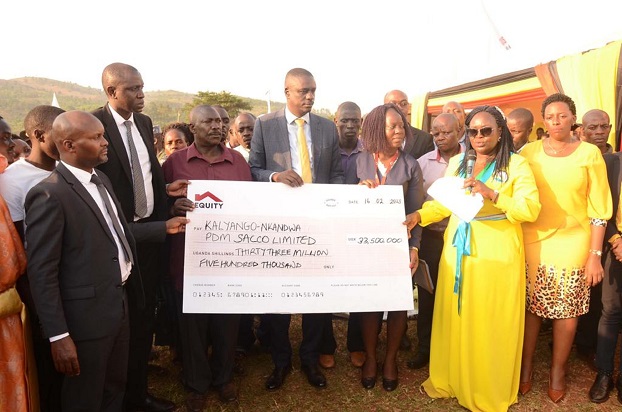Activists addressing journalists
The Ministry of Finance and Bank of Uganda should review the conditions attached to the Shs200bn relief funds meant to cushion Small and Medium Sized Enterprises (SMEs) from the shock of the pandemic.
The call has been made by a section of civil society groups.
It should be recalled that on 23rd November 2021, the Ministry of Finance and Bank of Uganda launched the Shs200Bn Small Business Recovery Fund of which government would allocate Shs100bn and the other Shs100Bn would be provided by Centenary Bank, Post Bank, Stanbic Bank and other Financial institutions.
While addressing journalists in Bukoto on Sunday, John Walugembe, Executive Director, Federation of Small and Medium-sized Enterprises (FSME) called for the review on some of the conditions especially the SMEs bearing the cost of paying insurance fees and legal fees during loan processing as well as collateral that the borrowers will have to produce before getting the loans.
He said there is need to review the condition that states that the loan facility will be secured by any form of collateral as agreed upon the Participating Financial Institution in accordance with its lending policy.
“We think this puts borrowers unnecessarily at the mercy of the institution. They already have their lending policies, these SMEs have already failed to access the money, now if we are saying we are going to subject them to those same requirements, this is something that should have been addressed better,” Walugembe said.
He also revealed that despite the Fund being launched two weeks back, players in the SMEs sector were shocked to learn that some of the participating lenders were clueless of the said Fund.
“A number of our members have already approached the financial institutions, but it appears a number of them are still ignorant about the existence of the Fund,” he said.
Herbert Kafeero, Communications Coordinator at Southern and Eastern Africa Trade Information and Negotiations Institute Uganda (SEATINI), revealed that the Fund will be administered by the Central Bank and businesses employing 5-49 people, with an annual turnover of Shs10m to Shs100m are eligible to apply for the loans at 10% interest.
Kafeero urged Government to embark on training SMEs in areas of book keeping and online marketing in order for small businesses to have impact on their operations and recover from the effects of the pandemic.
“Government shouldn’t overlook the issue of online marketing. These businesses have been affected and with the advent of Covid, the digital platforms play a critical role in reaching the prospective customer. So we call upon government to put up a robust training through its agencies to prepare the SMEs to use the funds, get profits and pay back so that other SMEs can borrow,” Kafeero said.
Joanita Nassuna, Programme Associate, Women and Economic Justice called for regional balance in terms of implementation of the SMEs Fund saying the initial relief given to Uganda Development Bank (UDB) only benefited businesses in the central region, leaving those in Northern Uganda struggling to survive.
“People from Northern region don’t benefit from these funds, like UDB funds only benefited Kampala metropolitan. So we called Government to allocate these funds to participating financial institutions that are regionally spread for equitability in access that SMEs outside Kampala can equitably benefit. So countrywide sensitization is needed,” Nassuna said.





